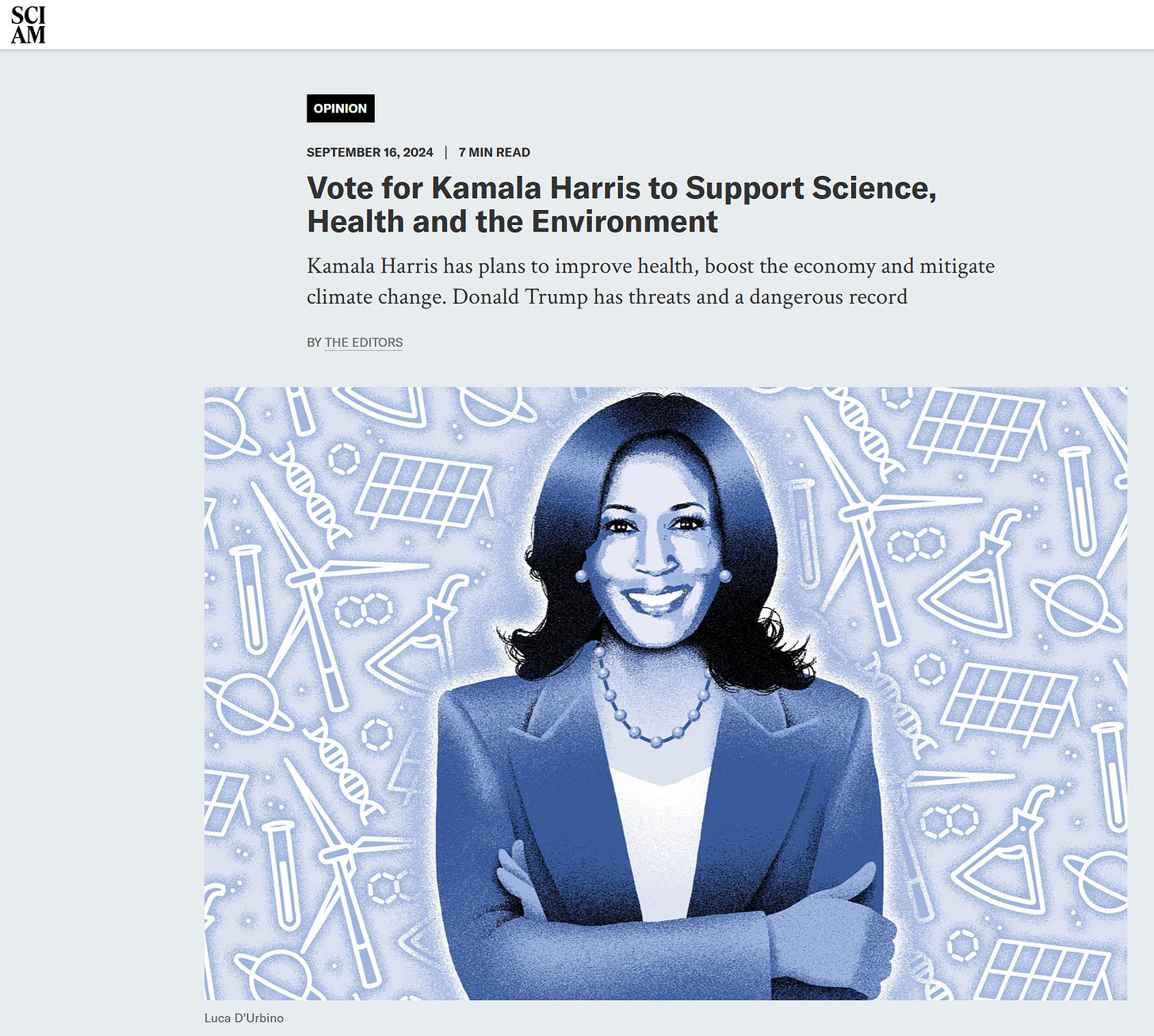Scientific American's recent endorsement of Kamala Harris brought me back to Nature's endorsement of Joe Biden in 2020, both of which signal a stark departure from the traditionally apolitical stance science journals have historically taken. Scientific American, in its 179-year history, has only endorsed a presidential candidate twice, once in 2020 for Biden, and now again, just yesterday, for Harris. Similarly, Nature, another highly respected journal, also made its rare foray into political endorsements during the 2020 election, emphasizing Biden's commitment to “evidence-based policymaking” on critical issues like climate change and the COVID-19 pandemic.
These endorsements were framed as a defense of science against the "anti-science" positions of Donald Trump’s administration, positioning these candidates as champions of scientific integrity. However, this selective focus on certain narratives while failing to address evolving data raises concerns about objectivity.
As someone in my fourth year as an assistant professor in 2020, with aspirations to contribute to respected journals like Nature, it was deeply unsettling to watch how overtly political they were becoming. This growing politicization of science, which had been a gradual concern for me, crystallized during that time. Science, at its core, should be about questioning assumptions, continuously updating conclusions as new data emerges, and fostering debate, not aligning with political figures or parties to push a singular narrative.
By the time these endorsements were made, I had already begun questioning the dominant narrative surrounding climate change. I was concerned by the lack of space for legitimate scientific debate on alternative views about energy policy and environmental strategies. It seemed as though only one perspective was being promoted, while dissent was dismissed or outright attacked.
Similarly, I felt increasing apprehension about the COVID-19 policies, particularly school closures. While they were framed as essential for protecting children, the data clearly showed that children were at far less risk from the virus. I found it hard to reconcile the claim that these decisions were driven by "evidence-based policymaking" when the risks to children from COVID were minimal and the long-term harm of keeping schools closed seemed obvious. Seeing these journals endorse politicians who had pushed these policies made it clear to me that the line between science and politics was no longer clear, and it made me question whether I wanted to publish in journals that had shifted from scientific exploration to political advocacy.
This shift, in my view, risks alienating the public and fostering growing distrust not only in scientific institutions but in the concept of science itself. When journals begin endorsing candidates and aligning with specific political agendas, they send a message that they are no longer neutral platforms for debate and discovery, but rather partisan players in the broader political arena. For me, this realization marked a turning point, making it clear that I would no longer see these journals as potential homes for my work.
It's important to note that Scientific American is not a peer-reviewed journal like Nature or Science, but it remains one of the most widely-read and influential science magazines in the world. With a broad readership, it plays a significant role in shaping public understanding of scientific topics, which makes its political endorsements particularly impactful. While it may not publish original research, its popularity and reach allow it to sway public opinion on scientific and political issues.
Laughable Claim of "Evidence-Based Policy Making"
The claim of 'evidence-based policy-making' touted by these endorsements is, frankly, laughable when we reflect on how the pandemic unfolded. For instance, much of what was initially labeled as "misinformation" by public health officials, and supported by media outlets and many prominent scientific voices, later turned out to be either true or worthy of debate. Take the lab-leak hypothesis for COVID-19, once dismissed as a conspiracy theory but now recognized by many scientists and government agencies as a plausible origin. Similarly, the shifting stances on mask efficacy, natural immunity, school closures, and vaccine mandates demonstrate that early certainty was grossly exaggerated. Journals like Nature and Scientific American endorsed politicians who embraced these premature conclusions, presenting them as champions of science despite the fact that the "science" was far from settled.
This raises a fundamental problem: who defines what constitutes "evidence-based" policy? These journals positioned themselves as arbiters of truth, even as the underlying science evolved. To label certain information as misinformation, without room for debate or dissent, has only fueled skepticism. It is hard to reconcile their claims of defending science when their chosen candidates themselves often sidelined or suppressed scientific debate in favor of political narratives.
The Political Agenda Behind Science Endorsements
These endorsements weren't just about science, they were thinly veiled political stances. Nature, in endorsing Biden, highlighted issues like immigration, climate change, and global leadership. These are, of course, significant topics, but they also carry ideological weight. Biden’s return to the Paris Agreement or his proposed clean energy plan might be laudable from a certain political viewpoint, but they are by no means the only "scientific" solutions to these problems.
Moreover, the journals’ condemnation of Trump for undermining science by ignoring climate change or promoting deregulation fails to consider that there can be legitimate scientific disagreement on the best path forward. For example, debates over nuclear energy, environmental trade-offs of renewables, and even the actual impact of certain regulations on innovation show that "evidence" can be interpreted in multiple ways depending on the priorities one chooses to emphasize.
Damaging Trust in Science
The most troubling part of these endorsements is how they undermine public trust in science. When scientific journals take sides in elections, they risk alienating large portions of the population who do not share the same political beliefs. A 2023 Nature Human Behaviour study found that political endorsements from scientific publications can reduce their credibility. The authors state,
Keep reading with a 7-day free trial
Subscribe to Irrational Fear to keep reading this post and get 7 days of free access to the full post archives.




